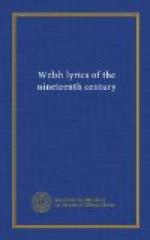How to Brigantum’s town one day,
All unattended, he took his way,
And to the fair queen’s palace came—
Cartismandua was her name.
Then cried the queen, “For many a year
To me and mine thou hast been dear:
Safe mayest thou dwell in this my land,”
And she kissed the scars on his strong right hand.
Then, with her own white royal hand,
She losed his hauberk’s metal band,
And in her fairest chamber laid
His bow of steel and his flashing blade.
With dainties quickly the board is laid,
And mead—the sweetest ever made,
Beaming with joy is every face,
And mirth and feasting fill the place.
The royal harpist sweeps the strings,
And brave Caradoc’s deeds he sings,
His foes deriding, and most of all
Ostorius, the Roman general.
But evening fell—that fatal night
That darkened all our nation’s light:
In sleep his head Caradoc laid,
And woke—a captive, bound, betrayed.
Aregwedd {66} she, of winsome smile,
Who broke the strength of Britain’s Isle,
And gave the Samson of our land
Delilah-like to the Roman’s hand.
* * * * *
A triad of triads, yea, thrice three score,
Of traitors our land has borne and more,
And traitors many within the sound
Of the Western sea may yet be found.
If e’er from love or hate you try
To trace a Welshman’s pedigree,
There is a book—for you ’tis meant,
A bluebook of high Parliament.
For in this book incorporate
A thousand facts, brought up to date,
Prove that each father, mother, son,
In Wales is baseborn—every one!
It further shows there’s scarce a wight
In all wild Wales knows how to write!
That none of those who only talk
Their native tongue know cheese from chalk.
That ‘Eisteddfodau’ Welshman teach
To spurn the thrice blest English speech:
Welsh books—there are none, save what quacks
Sell the poor churls as almanacks.
That therefore that most grievous sin
Yclept Dissent is rife therein;
But if ‘the English’ were more prized,
Wales might some day be—civilized!
Ring out, O bells—proclaim our glee
That a real nation we yet may be,
When English blessings reach us here—
Mountains of beef and floods of beer!
Fraud and treason garbed as grace
In the Blue Book find a place,
And in the ‘Triads of Treachery’
Let these ‘Three Spies’ remembered be.
A Mother’s Message.
Her visit was ended and back to her home
Far away my dear mother was going;
But now that the hour for parting was come
With sorrow her heart was o’erflowing.
Oh pale grew her cheeks and fast fell her tears,
Her faltering counsels delaying,
Then low fell these words on my listening ears,
“You know what my heart, dear,
is saying.”
Not a word of the devil, his plans and his wiles,
His lies and his love of deceiving,
Not a word of the world with its follies and smiles
She said when her son she was leaving.
I know on my journey she wished me all bliss,
I know that for me she was praying,
But all that I heard her lips utter was this,
“You know what my heart, dear,
is saying.”




